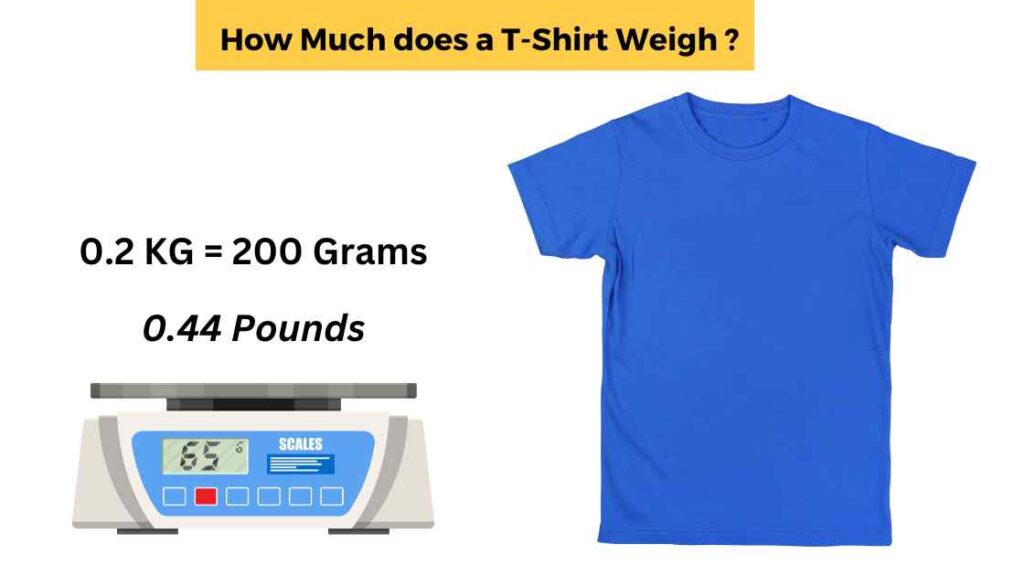Have you ever wanted to know how much does a shirt weigh ? It’s an interesting question and it turns out that the answer is not as simple as one might think. The weight of a shirt depends on several factors, including its size and fabric.
We will explore the various elements that affect the weight of a shirt and provide some helpful tips for those who need to figure out just how heavy their favorite top really is.
By looking at the different types of fabrics used in shirts, considering the garment style and taking into account other factors such as buttons or embroidery, it’s possible to come up with an estimate of how light or heavy any given piece may be.
How Much Does a T Shirt Weigh?

Considerations such as shirt size, fabric, and thickness all affect how much a T-shirt weighs. Traditional cotton T-shirts for adults typically range in weight from 5 to 8 ounces (142 to 227 grams). Certain winter T-shirts, however, might weigh as much as 12 ounces (340 grams) due to the usage of thicker textiles.
There are also T-shirts that weigh less than 5 ounces thanks to the use of fabrics like bamboo or rayon (142 grams).
Why you Should know How much does a Shirt Weigh?
Knowing the weight of a shirt is important for many reasons. For one, it helps you decide how much clothing to pack when traveling. Heavier shirts may take up more space in your suitcase and be less comfortable to wear due to their increased weight.
Additionally, it’s helpful to know if a shirt will fit comfortably on your body or not. Thicker materials weigh more than lighter ones; therefore, if you’re looking for something light-weight that won’t feel heavy against your skin, knowing the weight of the fabric can help ensure you make an informed decision.
Also Read: Can you tie dye a Grey Shirt? Full Guide (2023)
How To Weigh A Shirt: Different Methods You Can Use

Weighing a shirt is an important step to take before purchasing or laundering it. There are various ways you can determine the weight of your shirt depending on what resources you have available.
-Using Kitchen Scale:
The simplest way to weigh a shirt is by using a kitchen scale, which usually measures grams and ounces. It’s easiest if you lay the shirt flat on top of the scale so that its full weight is evenly distributed. This will provide you with an accurate measurement in either metric or imperial units, whichever unit your scale uses.
-Using Bathroom Scale:
If you don’t have access to a kitchen scale, then another option would be to use bathroom scales. These generally measure kilograms only but should still give you an approximate idea of how much your shirt weighs.
-Using Spring Balance:
Another option for weighing a shirt would be to hang it from one end on something like a hook or hanger connected to a spring balance, which is typically used for measuring forces such as mass and tension. The spring balance will record the exact amount of force exerted onto the object when suspended from the hook or hanger, providing you with an accurate reading of its weight in kilograms or pounds.
-Measuring Tape and Calculator:
Without access to a scale, you can roughly determine the weight of a shirt by measuring its dimensions and plugging them into a calculator. Using centimeter measurements for the shirt’s length, width, and height, you can calculate its volume in cubic centimeters.
The approximate weight can be calculated by multiplying the cubic centimeters of the fabric by its density (often approximately 1 gram per cubic centimeter). That’s maybe a complicated method but it does the job.
Alternatively, if these tools aren’t accessible, try asking someone else who has them – this could be helpful if they already know how to operate these devices correctly!
A Simple Table for Basic Understanding of How Much Does a Shirt weigh for Men and Women.
Men’s Shirts
| Men’s Shirts | Weight |
|---|---|
| Polo Shirt | 0.3 kg |
| Dress Shirt | 0.4 kg |
| T-Shirt | 0.2 kg |
| Henley Shirt | 0.25 kg |
Women’s Shirts
| Women’s Shirts | Weight |
|---|---|
| Blouse | 0.3 kg |
| T-Shirt | 0.2 kg |
| Tank Top | 0.15 kg |
| Button-Up Shirt | 0.35 kg |
Factors That Affect The Weight Of Shirts: Fabric, Size, And Style

The weight of a shirt is determined by several factors. The fabric used for the garment plays an important role, as some fabrics are heavier than others. For instance, denim and wool shirts tend to be much heavier than cotton or linen ones. In addition, size affects the weight of a shirt; larger garments usually weigh more than smaller ones due to their greater surface area.
Related: How to Wash Sublimation Shirts? A Complete Guide (2023)
Finally, style also contributes to the overall weight of a shirt – those with intricate details such as pockets, collars and buttons can be significantly heavier than simpler designs. All these elements combined will determine how heavy a particular shirt is. To sum up, fabric, size and style all impact the total weight of a shirt.
Comparing The Weight Of Different Types Of Shirts: T-Shirts, Dress Shirts, And More
The weight of a shirt depends on the type and material.
T-shirts generally weigh between 4 to 5 ounces,
While dress shirts can range from 4 to 10 or more ounces depending on fabric and construction.
A heavier t-shirt could weigh up to 6 ounces due to extra cotton or thicker weave.
Heavier dress shirts can be over 12 ounces when made with high thread count fabrics like silk, satin, linen, or denim.
When considering materials used in making shirts, polyester blends are usually lighter than 100% cotton options.
Also Read: How to sublimate on dark Shirts ? (2 Best Methods)
Lightweight Vs. Heavyweight Shirts: Which Is Right For You?
The weight of a shirt can vary significantly depending on the material and style. Lightweight shirts are most often made from cotton, linen, or silk, while heavyweight shirts typically come in wool blends and heavier fabrics such as flannel.
Generally speaking, lightweight shirts are thinner and cooler to wear but may not last as long as heavier-duty materials. On the other hand, heavyweight shirts tend to be more durable and better suited for colder climates.
Ultimately, it’s up to you to decide which type of fabric is best for your needs and lifestyle. Consider factors like climate, durability, comfort level, price point etc., when selecting between lightweight versus heavyweight fabrics for your wardrobe staples.
How Much Does A Shirt Weigh On Average?

Men’s Shirt
On average, a men’s shirt weighs between 5 and 6 ounces. This is the equivalent of 140 to 170 grams. The fabric type plays a role in determining how much the shirt will weigh, with heavier fabrics such as denim weighing more than lighter materials like cotton. Men’s shirts also tend to be larger than women’s which can add extra weight.
Women’s Shirt
Women’s shirts usually weigh slightly less than men’s due to their smaller size and lighter fabrics used. Typically, they range from 4 to 5 ounces or around 110-140 grams.
However, this can vary depending on style and material. It is important to note that these measurements are an approximation based on standard sizes for both genders; actual weights may differ when accounting for variations in fabric types and design details.
Related: How to fix a Sublimation Mistake on a shirt?
Traveling With Shirts: How Much Weight Should You Expect To Carry?
When traveling, it’s important to consider how much weight you’re carrying in your luggage. Shirts can add a surprising amount of heft and bulk, so when packing for a trip it is wise to be mindful of the total weight.
Generally speaking, men’s shirts tend to be heavier than women’s shirts due to their larger size and thicker fabric. On average, a man’s shirt may weigh anywhere from 8-12 ounces while a woman’s shirt weighs 5-7 ounces. It is therefore important to take into consideration these factors before adding multiple pieces of clothing to your suitcase.
Knowing this information ahead of time will help ensure that your journey remains stress free as you won’t have any surprises at the check-in counter or baggage claim area.
Tips For Choosing The Right Weight Of Shirt For Different Occasions

Firstly, you should think about what kind of climate and environment you will be in while wearing your shirt. If you’re likely to be outdoors or in an area with warmer temperatures then lighter fabrics such as linen or silk blend may suit better than heavier ones like cotton or wool.
Lightweight materials can help keep you cool and comfortable in these conditions. On the other hand, if you’re going somewhere colder then a thicker fabric is generally more suitable. This helps protect against cold winds and provides extra insulation which keeps body heat trapped close to your skin.
Another important factor when selecting a shirt is its purpose – formal wear requires something more substantial that could last through multiple uses whereas casual shirts tend to need less durability and can benefit from softer textures and thinner weights.
Frequently Asked Questions
Q: How much does a shirt weigh to ship?
T-shirt shipping weight is calculated by factoring in the shirt’s dimensions, fabric, and packing. Six to eight ounces (170 to 227 grams) is the typical shipping weight for a plain cotton t-shirt, while one to two pounds is typical for a denim shirt (453 to 907 grams). Weighing the package prior to shipping is recommended.
Q: How much does a shirt weigh in lbs?
Shirt weight in pounds varies with style, fabric, and construction details. Weights range from 136 to 227 grams for a standard adult cotton t-shirt, and anything from 0.8 to 1.5 pounds for a denim shirt (362 to 680 grams). The best way to ascertain the shirt’s exact weight in pounds is to weigh it.
Q: What is the weight of a denim shirt?
A denim shirt’s weight can range from a few ounces to several pounds, depending on the size and fabric’s density. The typical weight of a denim shirt for males is between 8 and 16 ounces (227 and 454 grams), whereas a denim shirt for women typically ranges from 6 to 12 ounces (170 to 340 grams).
Q: How much does a polyester shirt weigh?
A polyester shirt’s weight can range from about ten to twenty pounds, depending on the size and fabric thickness. Polyester t-shirts for adults can range in weight from from 3 to 6 ounces (85 to 170 grams) on the low end to 10 ounces (283 grams) or more for more substantial garments like those worn in colder climates.
There is a wide variation in shirt weight for men, often between 0.2 and 0.5 kg (or 0.44 to 1.1 pounds).
Q: How much does a cotton shirt weigh?
The typical weight of a cotton shirt is between 0.2 and 0.4 kilograms, though this can vary greatly depending on the shirt’s thickness and size (or 0.44 to 0.88 pounds).
Q: What is the weight of a women’s blouse?
Furthermore dependent on fabric, size, and cut, a women’s blouse’s weight might range. About 0.2 to 0.4 kilograms is the average weight of a woman’s blouse (or 0.44 to 0.88 pounds).
Q: How much does a dress shirt typically weigh?
The average weight of a dress shirt is between 0.24 and 0.32 kilos (0.44 and 0.88 lb), though this can vary widely depending on the garment’s material and size. The weight of some men’s dress shirts, especially those constructed of heavier materials or in larger sizes, can approach half a kilogram (or 1.1 pounds).
Conclusion
In conclusion, the weight of a shirt can vary depending on the material and style. When comparing shirts, it’s important to consider if you’re looking for a lightweight or heavyweight design. For washing, remember that lightweight fabrics may require more gentle care while heavier materials might need more scrubbing power.





